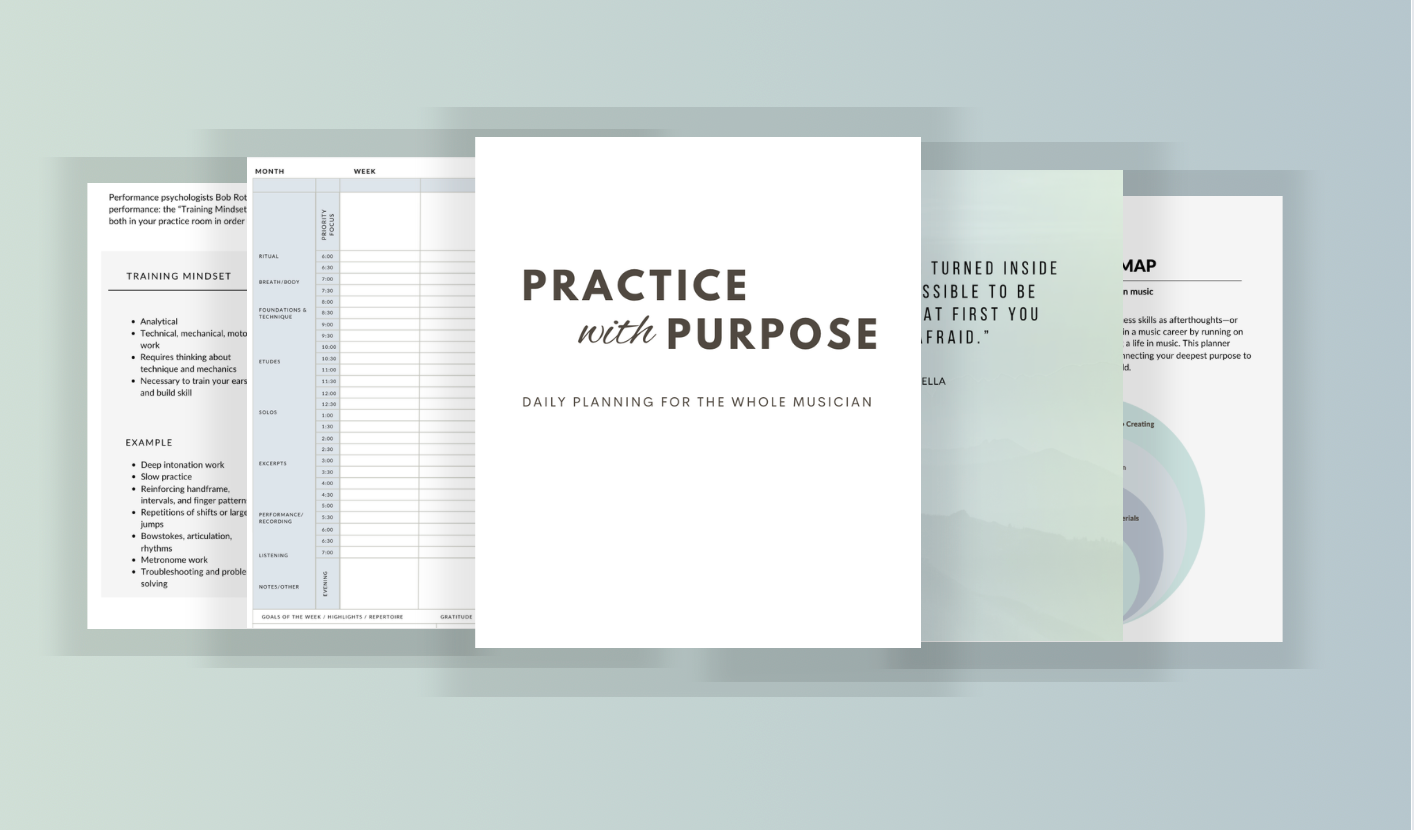5-Step Method to Plan Your Semester

Hey, it’s Zoe here!
I’m speaking to my fellow music students! Who’s ready to dive into the new school year? For many of us, a new semester brings a fresh excitement but also a looming anxiety that not everything will happen that needs to happen. And if you’re at all like me… that thing isn’t gonna happen unless I schedule it in.
This semester, I want to learn a concerto for a competition, prepare a sonata and a couple showpieces for my degree recital, and learn two new string quartets with my chamber group, all in addition to taking regular classes and writing up my graduate research thesis. Is it all going to happen? 😰
Here’s a 5-step method I’ve started doing to actually meet my goals for my repertoire. I find it has helped me stay more focused, thorough, and consistent. More importantly, it gives me motivation to start practicing every day because I don’t waste time or energy trying to figure out what to work on that day, and I don’t get overwhelmed with everything that needs to happen. The task instead becomes bite-sized and manageable enough to look forward to finishing, so I just take out my instrument and get to work.
I won’t lie: planning does take effort. It requires thinking ahead, dividing up tasks, and looking at your music. When I first started doing big-picture planning I would get anxiety thinking about how everything was supposed to fit together, and it would take hours to come up with a plan I was happy with. As with anything, though, it gets easier as you do it more, and you’ll find a way to plan that balances efficiency with detail. And what better time to start getting good at it than right now, as we’re about to head into a new semester?
So pour yourself a cold drink… grab your iPad, journal, calendar, or this 4-month Practice Planner… head to the beach if you’re me… and let’s get the ball rolling!
1: Make a big-picture plan.
Ask yourself these questions:
- What intention do you want to set for your semester?
- What are your big goals?
- What are the biggest “landmarks” or important events (auditions, recitals, juries, etc.)?
Write down these goals and dates in your calendar or planner!
2: Break up the semester by month.
- Where do each of your landmarks land? Is there a particular month (hello, December) that looks busier than others where you’ll need to budget your time, or work ahead the month before?
- Work backwards: what do you need to accomplish each month in order to meet your big goals?
Now, write down some medium-sized goals that will lead you to your bigger goals. For example, “Memorize Bach movements 3+4 by September” or “Put Brahms sonata together with piano by October” or “Perform all of Ysaÿe in studio class by Thanksgiving Break.”
3: Create a weekly plan.
Now, each week, sit down and decide:
- What are smaller-sized goals this week that will help you reach your monthly goal?
- How do you want to divide up your focus for each day?
- Plan flex days and rest days into your week or in case something unexpected comes up… or you need to take a break.
4: Write your weekly goals into a day-by-day plan.
Whether as you create your weekly plan, or each night before bedtime, decide:
- what rep to work on?
- which sections to focus on?
- how to practice each section?
Try to keep your goals bite-sized and manageable. Keep in mind how much time you’ll have in the day and when you’ll actually be able to practice. Write these specifics into a journal, spreadsheet, table, calendar, or just a plain ol’ piece of paper — whatever keeps you organized. This way, when you wake up, you won’t waste time or motivation deciding what to practice.
5: GO DO IT.
None of this planning will be of any use if you don’t follow it!
As you work through your list, make a few notes on which measures you completed, what tempos you used, which variations or rhythms you practiced, what technical tools you’ll need to remember, etc. That way, when you come back tomorrow, everything is in one place and you won’t waste time trying to figure out what happened yesterday.
Remember, also, though, as you work to check off your goals, that it’s okay to change your plan. Sometimes new ideas spring up, or you realize that your plan doesn’t address the most pressing issue, or your brain just isn’t functioning and a slow note-by-note practice sounds much more intuitive than a run-through of a performance. Stay aware of your needs and adjust accordingly.
And if you didn’t finish everything in your list, that’s okay too! Life doesn’t always go according to plan, and the plan is there to HELP you, not to make you feel guilty. There will always be tomorrow… and the flex days can be helpful buffers as well. And sometimes, well… it is what it is. Nothing is ever perfect.
Hope this empowers you to enter your semester with a solid vision and a path that helps you reach it!
Happy planning, and happy practicing!
~ Zoe ~
Oh, by the way… if you’re looking for a creative space to journal, reflect, and map out your plan, we’ve designed this digital 4-Month Practice Planner for you!
For $25 you’ll get 150+ pages packed with...
- streamlined guidance for long-term and short-term plans
- weekly goal map + practice trackers
- reflection questions for future sessions
- space for daily/weekly notes
- research-based strategies for practice routines
Check it out here!


